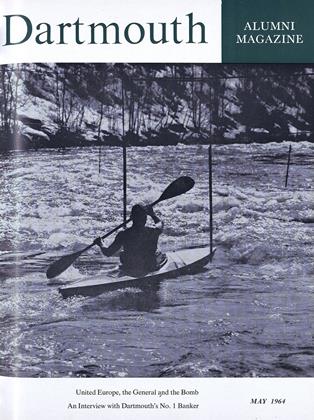The most recent publication by Frederick C. Dyer (Tuck '48), Blueprint for Executive Success (Prentice-Hall, Inc.), consists of three 100-page plastic-covered volumes in a hard-cover case. It is a selection of the Business Leaders Book Club. During 1963 Mr. Dyer published two others, Export Financing: Modern U.S. Methods (University of Miami Press) in collaboration with his brother John and The Petty Officer's Guide (Stackpole Co. of Harrisburg, Pa.) with Rear Admiral Harley F. Cope USN (ret.). Mr. Dyer is Head of the Evaluation Branch of the Leadership Staff in the Bureau of Naval Personnel.
John R. Nash '60 is the author and illustrator of Our Devil Takes a Holiday (Lunenburg, Vt.: Stinehour Press, 1963. 27 pp.), a collection of letters and sketches he sent from Europe to the Stinehour Press.
Robert H. Lafleur '58, Instructor in European History at Mary Baldwin College, is the author of two instructional aid textbooks published by Monarch Press, Inc., New York City. Review Notes in Medieval History (128 pp., paper cover, plastic binding, $1.95) begins with a chapter of the "Fall of Rome and the Rise of Christianity" and concludes with the events ending the 15th Century. Material is presented in an expanded outline form and would serve as a helpful supplement to lecture or fuller textbook presentation. Review Notes in Educational Psychology (115 pp., similar binding, printing, and cost) handles its course outline in much the same way as with the history text aid. The historical material, however, appears to be better suited to this approach.
John Crowe Ransom is the title and subject of Prof. John L. Stewart's 48-page contribution to the University of Minnesota Pamphlet Series on American Writers (University of Minnesota Press: Minneapolis, paper cover, 65 cents). After a very brief biographical sketch and but little more on "The Fugitives," the South, and Southern tradition of writing from which Ransom emerged, Professor Stewart deals with skill and insight with Ransom's poetry in both its themes and techniques. "Man needed the binoculars of poetry fitted with the lens of metaphor," Stewart writes in introducing his subject. "To help him look at his experience through them has been the final intention of all of Ransom's thought, writing and teaching." Stewart goes on to evaluate how well Ransom fulfilled his intentions.
 View Full Issue
View Full Issue
More From This Issue
-
 Feature
FeatureUNITED EUROPE, THE GENERAL AND THE BOMB
May 1964 By HENRY W. EHRMANN, -
 Feature
FeatureDARTMOUTH'S NO. 1 BANKER
May 1964 By DERO A. SAUNDERS '35, -
 Feature
FeatureA New Strategy of Liberal Learning
May 1964 -
 Article
ArticleTHE UNDERGRADUATE CHAIR
May 1964 By DAVE BOLDT '63 -
 Class Notes
Class Notes1936
May 1964 By BARRY C. SULLIVAN, GILBERT BALKAM -
 Class Notes
Class Notes1922
May 1964 By LEONARD E. MORRISSEY, CARTER H. HOYT








